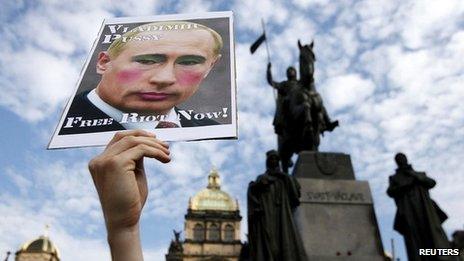Will Pussy Riot criticism affect Putin?
- Published

The Pussy Riot verdicts sparked protests in many cities across the world
It was a protest that lasted less than a minute, a trial that lasted barely a fortnight and a verdict that took three hours to read out.
But the Pussy Riot case is being held up by Western diplomats and human rights groups as the embodiment of many things that are wrong with Russia, and the sudden, dangerous direction the country appears to have taken since Vladimir Putin returned to the presidency in May.
A group of spirited women artist/activists had dared to do the unthinkable. They took their shock tactics into one of the most sacred parts of Moscow's main church, the Cathedral of Christ the Saviour.
They were young, foolish, and highly insensitive to the religious feelings of others, but groups like Amnesty International say that that in no way justifies turning the full power of the Russian state on them.
Instead of being fined for a public order offence, three of them were arrested and detained for five months before being put on trial and convicted of the criminal offence of hooliganism motivated by religious hatred. They will now spend two years in a harsh Russian penal colony.
Pussy Riot had been protesting against what they saw as the constitutionally damaging relationship between President Vladimir Putin and Patriarch Kirill of the Russian Orthodox Church. (The constitution says that Russia is a secular state and that no religion can be established as the state religion.)
Critics say the trial epitomises the authoritarian nature of Mr Putin's Russia
What human rights groups including Human Rights Watch are now saying is that the state's reaction to the women's action supports their complaint.
The church authorities were among the strongest cheerleaders for the prosecution. The trial at times felt like a session of some kind of quasi-religious court, with witnesses being asked if they were good practising members of the Orthodox Church.
Then there were the doubts about the trial's fairness. The defence lawyers appeared to despair at times at what they saw as blatant bias by the judge.
They were rarely allowed to question prosecution witnesses, and most of their own witnesses were not allowed. At times the case descended into a shouting match between the defence lawyer, Violetta Volkova, and Judge Marina Syrova.
Top-down system
That is why Western diplomats in Moscow says this case epitomises today's Russia.
It has a top-down political system, which the Kremlin micro-manages far too much. There is a blurring of lines between the state and the Russian Orthodox Church.
And, in the legal system, prosecutors and judges often appear to lack any kind of independence. Trials are often less courtroom dramas than courtroom farce.
So the Russian government has brought down a chorus of condemnation on itself, but the question is how much it really cares about that.
Firstly, many in Russia were genuinely outraged about the protest in the cathedral, and Vladimir Putin will be hoping to gain support from that conservative constituency.
Secondly, he seems to believe that the way to deal with dissent in Russia at the moment is to apply pressure on the new opposition rather than to engage with them.
Thirdly, international condemnation could actually help him appeal to those parts of Russian society who are still deeply distrustful of the West.
- Published11 August 2012
- Published30 July 2012